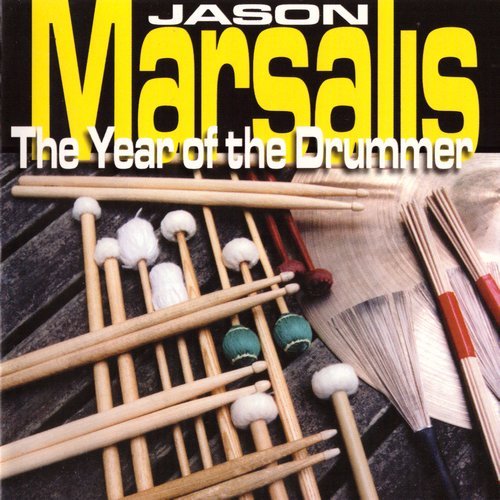Jason Marsalis - The Year of the Drummer (1998)

Artist: Jason Marsalis
Title: The Year of the Drummer
Year Of Release: 1998
Label: Basin Street Records
Genre: Jazz, Hard Bop, Post-Bop
Quality: FLAC (image+.cue, log, Artwork)
Total Time: 58:10
Total Size: 347.2 MB
WebSite: Album Preview
Tracklist: Title: The Year of the Drummer
Year Of Release: 1998
Label: Basin Street Records
Genre: Jazz, Hard Bop, Post-Bop
Quality: FLAC (image+.cue, log, Artwork)
Total Time: 58:10
Total Size: 347.2 MB
WebSite: Album Preview
01. In the Tradition (1:03)
02. The Upper Second Line (10:25)
03. Da Homey Dance (6:35)
04. Discipline (1:38)
05. Death March of Our Time (10:12)
06. He Who Swings de Rumba Clave (8:36)
07. Penelope (6:29)
08. Lucky Number 7 (4:58)
09. Hand Jivin' (3:06)
10. At the House, in da Pocket (4:07)
11. Discipline's Disciples (1:01)
You would think that the first album by the youngest member of the Marsalis family would garner quite a range of media coverage, but drummer Jason Marsalis' debut album as a leader didn't seem to inspire the sort of instant recognition that his brothers had earned. Even odder regarding the silence surrounding its release is that it is such an exceptionally fine recording by an inventive percussionist and gifted composer who draws from a vast array of influences (many of them listed in the liner notes), drummers and otherwise. Jason's father, legendary New Orleans pianist and sire of prodigious jazzmen, Ellis Marsalis, has been quoted as calling his youngest son the most musically advanced and gifted of his sons by the age of 21, and this debut certainly goes a long way towards supporting such a heady statement. The album was titled Year of the Drummer by Marsalis because an unusual number of drummers released their own records in 1998, from Jeff "Tain" Watts to Brian Blades. Marsalis' debut certainly holds its own next to those recordings. One of the most interesting things about the album is its adventurous eclecticism, in terms of both tastes and abilities, deftly jumping from percussion experiments to straight-ahead bop to New Orleans jazz to the Latin licks of "He Who Swings De Rumba Clave." On "Hand Jivin'," Marsalis even plays his drum solo with his hands, fleshing out interesting timbres that might have gone undeveloped with a typical solo, as he alludes to in his self-penned liner notes. The quintet never seems to overplay, and the five young musicians show a wonderful subtlety and feel for one other, which is at least partly attributable to their leader. The solos are kept to a minimum, but each instrumentalist takes advantage of his moments, particularly on "Death March of Our Time," a recording solidly in the line of John Coltrane (and, therefore, brother Branford as well). Marsalis' drumming on the wonderful, lively "The Upper Second Line" is scintillating, mixing in some rock fills with the jazz and quasi-Latin fills, and playing the second live groove at a faster pace than normal (hence the composition's title), which lends the tune a jittery, excited sensibility. And those are just the brightest moments on this intriguing, exploratory debut from yet another Marsalis whose music is worth being excited about.
![Joe Pass - Virtuoso (1974) [2025 DSD256] Joe Pass - Virtuoso (1974) [2025 DSD256]](https://www.dibpic.com/uploads/posts/2026-02/1771609997_ff.jpg)
![Magda Mayas' Filamental - Murmur (2026) [Hi-Res] Magda Mayas' Filamental - Murmur (2026) [Hi-Res]](https://www.dibpic.com/uploads/posts/2026-02/1771663724_i3cjtptz4ae2l_600.jpg)






![Tom Braxton - Flashback (2026) [Hi-Res] Tom Braxton - Flashback (2026) [Hi-Res]](https://www.dibpic.com/uploads/posts/2026-02/1771426129_1.jpg)